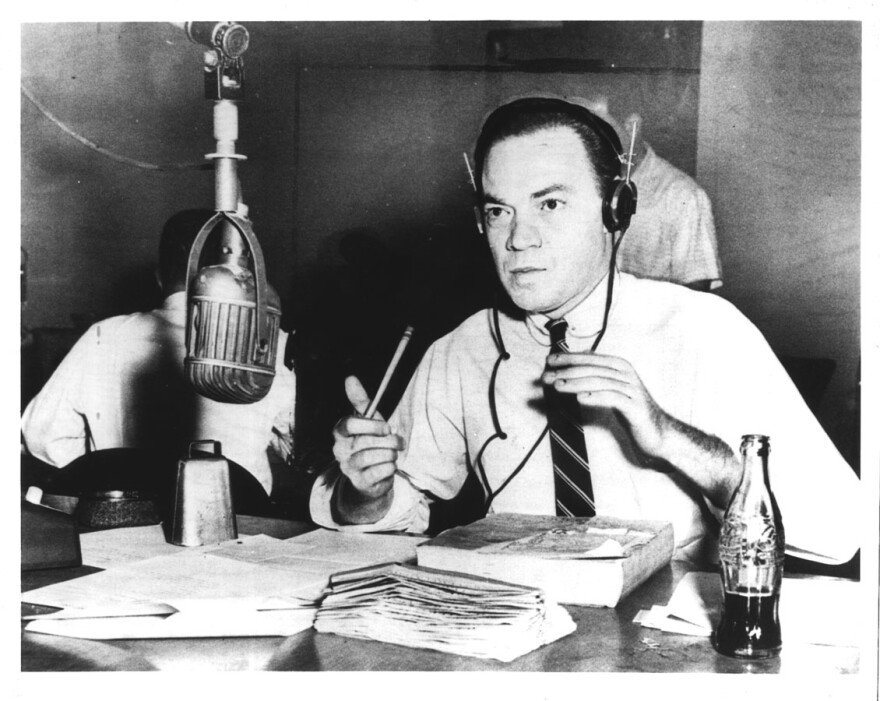On Saturday, the ashes of legendary disc jockey Alan Freed are due to come to their final resting place.
Freed blended a love of music with a dynamic radio personality to make an indelible mark on American popular culture.
For Ohio Public Radio, WCPN's David C. Barnett has this remembrance of the man who gave Rock and Roll its name.
The year was 1954 and the theme song spinning on a turntable at WJW in Cleveland sent a signal to young listeners across the city that the guy who called himself the “King of the Moondoggers” was about to hold court.

The wavy-haired broadcaster was part of a new breed of radio personality in the early 1950s known as a “disc jockey”, but unlike most of his fellow DJs, Freed’s mic stayed open when the songs started and he sang along in the background, beating out the rhythm on a nearby phone book.
A teenaged Billy Strawbridge was a fan. He and his friends were captivated by this white guy playing Rhythm & Blues tunes at midnight.
"Basically, back then, no one but black folks understood what a back beat was," Strawbridge said. "He understood it from the beginning."
While African-American listeners appreciated Alan Freed’s knowledge of their music, he also developed a sizable listenership among white kids.
Terry Stewart is the former CEO of the Rock and Roll Hall of Fame and continues to research Freed and his impact on popular music.
"He was very prescient in his view about this black art form that he re-named Rock and Roll --- basically he just relabeled Rhythm & Blues, when you get right down to it," Stewart said.
Making history
In 1952, Freed staged a concert featuring some of the most popular artists he played on his program. He advertised it as the “Moondog Coronation Ball”, and it was booked into the 11,000-seat Cleveland arena.
Billy Strawbridge was there. He says a riot nearly broke out when 20,000 people showed up.
"When the music started, the folks outside were trying to get in," Strawbridge said. "And the folks inside weren’t letting nobody in --- because there was no place to go. I mean, they were standing on top of each other."
After a few minutes, the event was cancelled, but it has since been cited as the world’s first Rock and Roll concert. Soon, Freed was famous. He moved to New York, where he was featured on TV, in movies and on radio station WINS.
Pay to play
Freed’s enthralling style also came to the attention of record promoters who started paying him to play their records. That practice came to be known as “payola”.

Terry Stewart says it was common in the music industry, and the authorities were starting to crack down.
"New York State had a commercial racketeering law, and of course, he was convicted and fined a few hundred bucks, but he lost everything --- he lost his career, it all went out the window," Stewart said.
Unable to find work in New York, Alan Freed moved to California. He died at the age of 43 in Palm Springs in 1965, largely due to the effects of alcoholism.
Freed’s cremated remains were sent to a New York cemetery. But, in 2002, he was back in Cleveland --- kinda. His ashes were put on display in the Rock and Roll Hall of Fame for the 50th anniversary of the Moondog Coronation Ball
Twelve years later, Freed’s son Lance got a request from the Rock Hall.
"I got a call from the new director of the Rock Hall, asking me to please come remove him ---'We don’t want human remains here,'" Freed said. "So, I went and picked him up, and we found a new home."
A final resting place
Tomorrow, Alan Freed’s ashes will be moved to a gravesite in Cleveland’s historic Lake View Cemetery, where the pioneering DJ will join the likes of crime buster Eliot Ness, oil tycoon John D. Rockefeller, 22 mayors and President James Garfield.
Music expert Terry Stewart says, it’s a recognition of Freed’s cultural impact.
"He was one of the big catalysts in the role that music played in bringing the races together," Stewart said. "When you think about how much he loved the music, how close he was to particularly all the black stars, how he did not play white cover records --- all of that is pretty extraordinary for the time."
And now, Alan Freed has finally found his place in the town where it all began.



